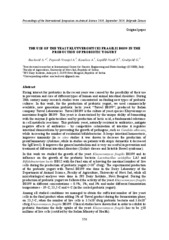| dc.description.abstract | Rising interest for probiotics in the recent years was caused by the possibility of their use in prevention and cure of different types of human and animal intestinal disorders. During 20th century many research studies were concentrated on finding new types of probiotic cultures. In this work, for the production of probiotic yogurt, we used commercially available, new generation probiotic lactic yeast “Turval B0399”, produced by Italian company Turval Laboratories. Turval B0399 is the culture of yeast species Kluyveromyces marxianus fragilis B0399. This yeast is characterized by the unique ability of fermenting with the enzyme β-galactosidase and by production of lactic acid, a fundamental substance in cell metabolic reactions. This probiotic yeast, naturally resistant to antibiotics, mitigate negative effects of antibiotics - by competitive colonisation of intestine it regulates intestinal dismicrobism by preventing the growth of pathogens, such as Candida albicans, while increasing the number of residential bifidobacterias. It keeps intestinal homeostasis, improves immunity (in in vitro studies it was shown to decrease the production of proinflammatory cytokines, while in studies on patients with atopic dermatitis it decreased the IgE level). It improves the general metabolism and is very successful in prevention and treatment of different intestinal disorders (Crohn's disease and Irritable Bowel syndrome).
In this work we studied the growth of the yeast Kluyveromyces fragilis B0399 and its influence on the growth of the probiotic bacteria Lactobacillus acidofilus LA5 and Bifidobacterium lactis BB12 with the final aim of achieving the maximal number of live cells during the production of probiotic yogurt (>106 cfu/g). The experimental production of the probiotic yogurt with Turval B0399 was done in the Dairy Laboratory of the Department of Animal Science, Faculty of Agriculture, University of Novi Sad, while all microbiological analyses were done in JPS Dairy Institute, Novi Beograd. During the production of probiotic yogurt we followed the activity of the yeast Kluyveromyces fragilis B0399 in different concentrations – 0.5%; 1%; and 3% and under different fermentation temperatures - 39◦C; 23,5◦C and 4◦C (in the cooled probiotic yogurt).
Among all studied conditions we managed to obtain the sufficient number of live yeast cells in the final product when adding 1% of Turval product during the fermentation phase on 23,5◦C, when the number of live cells is 3.5x107cfu/g probiotic bacteria and 3.6x105 cfu/g Kluyveromyces fragilis B0399. Clinical studies have shown that in order to exhibit its probiotic functions the daily uptake of the yeast Kluyveromyces fragilis has to be ≥10 millions of live cells (certified by the Italian Ministry of Health).
Sensor properties of this probiotic yogurt, odour, taste and colour, are preserved up to expiry date of 30 days. Final product is safe for use and has beneficial properties for good intestinal performance and general health of its consumers. | en |



